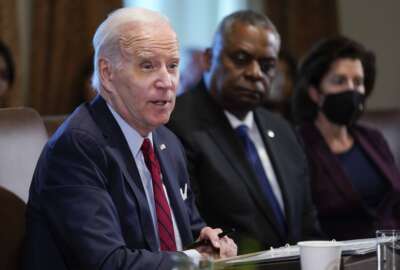Lawmakers seek new review of military voting assistance program
Members of the House Oversight and Government Reform Committee have sent a unanimous, bipartisan letter to the Government Accountability Office asking for a new...
Over the past three decades, Congress has passed and proposed several pieces of legislation designed to make it easier for deployed military members to vote. But a large group of lawmakers suspects that military and overseas voters are still being disproportionately disenfranchised, and recent research appears to support their concerns.
On Wednesday, the members of the House Oversight and Government Reform Committee sent a unanimous, bipartisan letter to the Government Accountability Office asking for a new review of the Federal Voting Assistance Program, the DoD office in charge of helping military members and civilians living abroad cast their ballots. The committee notes that GAO has issued several reports on FVAP since 2001, but says that “continued management attention to FVAP still remains a priority.”
Most of the worries expressed in the letter are based on statistics from the 2008 presidential election cycle — for instance, 33 percent of the absentee ballots sent to overseas voters never made it back to elections officials, and 22 percent of voters who requested ballots never got them.
And while Congress passed legislation in 2009 to require election administrators to send ballots in plenty of time to reach voters, more recent research suggests that problems have persisted. For example, a paper last month by Texas State University Professor Don Inbody noted that more than 285,000 military and overseas voters wanted to cast ballots in the 2012 election but couldn’t, and blamed many of the problems on uneven requirements among states that tend to cause voter confusion. While many voters never received their ballots in the first place, many of those that were returned were rejected because they arrived after absentee voting deadlines, which vary widely from state to state, or because of problems with signatures on the ballots.
A handful of states do allow overseas voters to either cast ballots online or receive their blank ballots electronically, but in its final report in January, the Presidential Commission on Election Administration recommended that all states move forward to at least communicate with overseas voters electronically, opining that while the Internet probably isn’t secure enough to handle ballots for all voters, military and overseas voters should serve as the first test bed, since most of the polling problems they face surround mailed ballots and inconsistent use of federal tools like the Federal Post Card Application for voter registration.
In Wednesday’s letter, the oversight committee hints at concerns that recent relaxations to the Postal Service’s delivery standards could make matters worse, and asks GAO to study whether the 45-day deadlines for mailing ballots need to be moved back even further.
Copyright © 2024 Federal News Network. All rights reserved. This website is not intended for users located within the European Economic Area.
Jared Serbu is deputy editor of Federal News Network and reports on the Defense Department’s contracting, legislative, workforce and IT issues.
Follow @jserbuWFED






